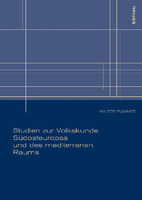Studien zur Volkskunde Südosteuropas und des mediterranen Raums
Author(s)
Puchner, Walter
Collection
Austrian Science Fund (FWF)Language
GermanAbstract
This volume includes 24 studies on comparative culture analysis in the Southeastern-European and Mediterrean area, as practizised in the "Ethnologia europaea" of Leopold Kretzenbacher, giving an idea of the plurality of possible topics and issues of folk culture in history and presence of this oldest part of Europe, which has not yet been really explored by interested readers. In t erms of subjects and methods these studies are partly located beyond the traditional thematical set of folklore studies: theoretical and terminological problems are discussed, cultural history since the late antiquity is involved, theological issues come together with research facts on customs and rites, masques and disguisings, issues of gender studies and sociology af ages are brought together with methodological critics on comparativism of the Victorian school of ethnography, the competitions of tournament are analyzed in historical and functional context as symbols of power and superiority of Venice in the Eastern Mediterrean, folk plays are examined as prefigurating structures of elaborated forms of folk theatre as well as the influences of Byzantine ecclesiastic painting and iconography on orthodox folk culture; other chapters focus on ethnosteretyps, on forms and functions of blood brotherhood (adoptio in fratrem) since late antiquity, the ways of reception of popular reading material throughout the Balkan peninsula since the 16th century are presented. Other studies are dedicated to the formation of religious traditions in West and East, between Catholicism and Orthodoxy, to fairy tales between orality and literacy, but also topics like the public display of personal feelings, forms of gestures, figures of demonology, narratives of oral autobiography, etymological and semantic questions are examined and research projects on oral folk literature are presented. One chapter is also dedicated to the ideological use of folklore studies in the nineteenth century. Chapters 15-24 focus more sepcifically on Greece without lacking wider comparative views.
The Introduction and the Conclusion, the selected bibliography at the end of the volume and the indices integrate these chapters in a unique perspective. The specific indices allow also a selective use of the volume. Der vorliegende Band stellt 24 Studien zur balkan-mediterranen Kulturkomparatistik im Zeichen einer Vergleichenden Volkskunde zusammen, wie sie vom Altmeister der "Ethnologia europaea", Leopold Kretzenbacher, betrieben wurde, und vermittelt einen lebhaften Eindruck über die mögliche Reichweite von Themen und Fragekomplexen, die sich in Geschichte und Gegen wart der Volkskultur des ältesten europäischen Kulturraums Europas stellen, den es für eine interessierte Leserschaft vielfach noch zu entdecken gilt. Unter methodischen Gesichtspunkten reicht die Vielfalt der Studien über den traditionellen thematischen Kanon der Vergleichenden Volkskunde hinaus: neben theoretischen und terminologischen Fragen wird in die Kulturgeschichte bis zur Spätantike ausgeholt, theologische Fragestellungen kommen neben Masken- und Brauchforschung zu stehen, alterssoziologische und gender-zentrierte Problematiken treffen auf die Methodenkritik der Viktorianischen Schule der Ethnographie, Sportgeschichte und ihre symbolisch-machtpolitische Funktionen kommen zur Sprache, das Volksschauspiel als genetische Struktur eine möglichen Theaterentwicklung ist thematisiert, die byzantinische Ikonographie wird in Einzelbeispielen auf ihre Auswirkung auf die balkanische Volkskultur analysiert, Untersuchungen zu Ethnostereotypen finden sich neben Formen und Funktio nen der Wahlbruderschaft in ihrer langen Geschichte, die Rezeptionachsen popularer Lesestoffe werden großräumig nachgezeichnet; dazu treten Studien zur mittelalterlichen Legendenbildung in West und Ost, religiöse Verserzählungen zwischen Orthodoxie und Katholizismus, Märchentypen zwischen Mündlichkeit und Schriftlichkeit, Fragen der öffentlichen Inszenierung persönlicher Gefühle, Dämonologie und Schimpfgebärden, Formen der oralen Autobiographie, etymologische und semantische Fragen, die Vorstellung einzelner Großforschungsprojekte wie auch die ideologische Funktion der Beschäftigung mit der Volkskultur im 19. Jahrhundert. Die Mehrzahl dieser Studien ist komparativ angelegt, die Kapitel 15-24 beziehen sich spezifischer auf die griechische Tradition bzw. Griechenland, ohne daß aber die vergleichenden Perspektiven gänzlich fehlen würden.
Ein Einleitungskapitel, das Schlußwort, die den Gesamtband betreffende Auswahlbibliographie und die umfassenden Register integrieren die Einzelkapitel in eine übergreifende einheitliche Perspektive, die Indices erlauben dahingegen auch einen handbuchartigen Gebrauch.
Keywords
comparative culture analysis in the Southeastern-European and Mediterrean area; Aarne-Thompson-Uther-Index; Athen; KretaDOI
10.26530/oapen_437177ISBN
9783205783695OCN
952493524Publisher
BrillPublisher website
https://brill.com/Publication date and place
2009Grantor
Imprint
BöhlauClassification
Society and Social Sciences


 Download
Download